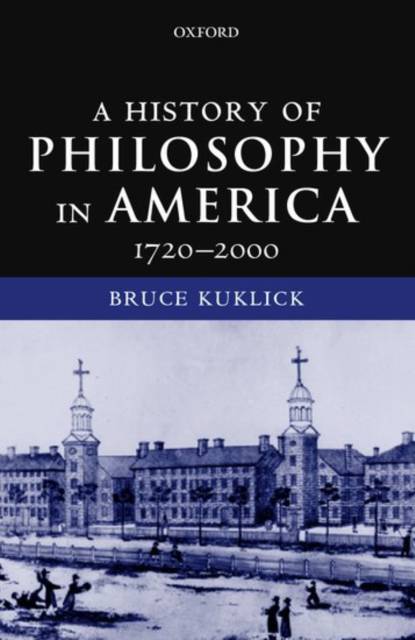
- Retrait gratuit dans votre magasin Club
- 7.000.000 titres dans notre catalogue
- Payer en toute sécurité
- Toujours un magasin près de chez vous
- Retrait gratuit dans votre magasin Club
- 7.000.0000 titres dans notre catalogue
- Payer en toute sécurité
- Toujours un magasin près de chez vous
188,95 €
+ 377 points
Description
Ranging from Joseph Bellamy to Hilary Putnam, and from early New England Divinity Schools to contemporary university philosophy departments, historian Bruce Kuklick recounts the story of the growth of philosophical thinking in the United States.
Readers will explore the thought of early American philosophers such as Jonathan Edwards and John Witherspoon and will see how the political ideas of Benjamin Franklin, Thomas Paine and Thomas Jefferson influenced philosophy in colonial America. Kuklick discusses The Transcendental Club (members Henry David Thoreau, Ralph Waldo Emerson) and describes the rise of pragmatism centered on Metaphysical Club of Cambridge (and members William James, Oliver Wendell Holmes, and Charles Peirce). He examines the profound impact Darwinism had on American philosophy and looks at Idealists such as the Kantian Josiah Royce and the Hegelian John Dewey. The book shows how, in the twentieth century, the Nazi conquest of Europe unleashed a flood of European intellectuals onto these shores, including such major thinkers as Theodore Adorno, Erich Fromm, Rudolph Carnap, and Alfred Tarski. Finally, Kuklick examines the contributions of such contemporary philosophers as Sidney Hook and Willard Quine and
such books as John Rawl's A Theory of Justice and Herbert Marcuse's One Dimensional Man. Kuklick pulls no punches in portraying the state of American philosophy today and its contested role in the intellectual life of the nation and the world.
The range of philosophical thought in our nation's history has been great, from Edwards's Religious Affections to Kuhn's The Structure of Scientific Revolutions, and Bruce Kuklick has captured it all in a book that blends intricate details with sweeping vision.
Readers will explore the thought of early American philosophers such as Jonathan Edwards and John Witherspoon and will see how the political ideas of Benjamin Franklin, Thomas Paine and Thomas Jefferson influenced philosophy in colonial America. Kuklick discusses The Transcendental Club (members Henry David Thoreau, Ralph Waldo Emerson) and describes the rise of pragmatism centered on Metaphysical Club of Cambridge (and members William James, Oliver Wendell Holmes, and Charles Peirce). He examines the profound impact Darwinism had on American philosophy and looks at Idealists such as the Kantian Josiah Royce and the Hegelian John Dewey. The book shows how, in the twentieth century, the Nazi conquest of Europe unleashed a flood of European intellectuals onto these shores, including such major thinkers as Theodore Adorno, Erich Fromm, Rudolph Carnap, and Alfred Tarski. Finally, Kuklick examines the contributions of such contemporary philosophers as Sidney Hook and Willard Quine and
such books as John Rawl's A Theory of Justice and Herbert Marcuse's One Dimensional Man. Kuklick pulls no punches in portraying the state of American philosophy today and its contested role in the intellectual life of the nation and the world.
The range of philosophical thought in our nation's history has been great, from Edwards's Religious Affections to Kuhn's The Structure of Scientific Revolutions, and Bruce Kuklick has captured it all in a book that blends intricate details with sweeping vision.
Spécifications
Parties prenantes
- Auteur(s) :
- Editeur:
Contenu
- Nombre de pages :
- 346
- Langue:
- Anglais
Caractéristiques
- EAN:
- 9780198250319
- Date de parution :
- 25-04-02
- Format:
- Livre relié
- Format numérique:
- Genaaid
- Dimensions :
- 236 mm x 160 mm
- Poids :
- 683 g

Les avis
Nous publions uniquement les avis qui respectent les conditions requises. Consultez nos conditions pour les avis.






